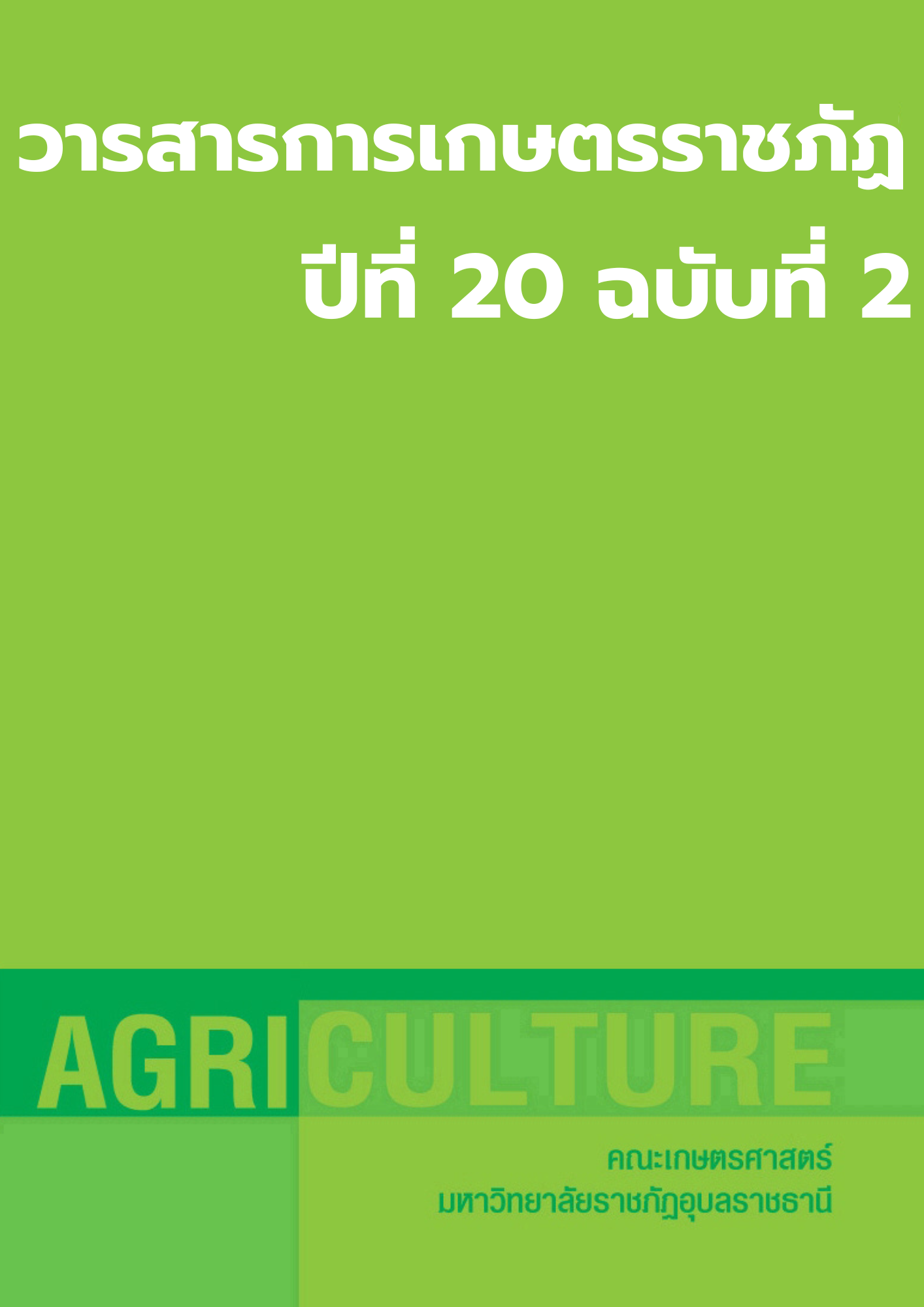ผลของการใช้น้ำมันหอมละเหยตระไคร้และน้ำมันหอมละเหยกระดังงา ต่อองค์ประกอบของซากไก่เนื้อภายใต้โรงเรือน ที่เลี้ยงในสภาพอากาศร้อนชื้น ฐิตาภรณ์ คงดี พัชรา ธนานุรักษ์ ชนณภัส หัตถกรรม ธันวา ไวยบท และ ชาญวิทย์ วัชรพุกก์
Main Article Content
บทคัดย่อ
การทดลองครั้งนี้มีวัตถุประสงค์เพื่อศึกษาองค์ประกอบของซากและความสามารถในการทนต่อความร้อนของไก่เนื้อลูกผสม 1,280 ตัว (C.P.707) โดยใช้แผนการทดลอง Factorial 2x4x4 ในการทดลองออกแบบสุ่มสมบูรณ์ (CRD) ของน้ำมันหอมระเหยตะไคร้ (Cymbopogon Citratus Stapf) และน้ำมันหอมระเหยกระดังงา Ylang Ylang (Cananga odorata) เกี่ยวกับองค์ประกอบของซากไก่เนื้อลูกผสมภายใต้โรงเรือนเลี้ยงไก่ในสภาพแวดล้อมที่ร้อนและชื้น โดยการผสมอาหาร - ผสมน้ำมันหอมระเหยแต่ละชนิดลงในอาหารสัตว์ที่ระดับ 0, 0.02, 0.04 และ 0.06% แล้วให้ไก่เนื้อและใช้วิธีการฉีดพ่น – ฉีดพ่นน้ำมันหอมระเหยแต่ละชนิดที่ระดับเดียวกันกับผสมในอาหาร ฉีดพ่นให้กับไก่เนื้อเป็นเวลา 1 นาทีในแต่ละวัน เปิดอัตโนมัติเวลา 14.00 น. ดำเนินการศึกษาที่ วิทยาลัยเกษตรและเทคโนโลยีชัยนาท จังหวัดชัยนาท ประเทศไทย จะเห็นได้ว่าอุณหภูมิภายนอกจาก Black globe (BGExt, 41.24±5.19 oC) สูงกว่าอุณหภูมิภายในจาก Black globe (BGInt, 34.41±3.48 oC) อย่างมีนัยสำคัญทางสถิติที่ระดับ (P<0.01) แสดงให้เห็นถึงผลกระทบของรังสีดวงอาทิตย์ต่ออุณหภูมิแวดล้อม และพบว่าสหสัมพันธ์ระหว่างพารามิเตอร์ทางสรีรวิทยาของไก่เนื้อที่ได้รับน้ำมันหอมระเหย (EOs) และอัตราที่ผสมในอาหาร (M) มีนัยสำคัญทางสถิติที่ระดับ {RT (P<0.01), SknT12 (P<0.01) และ SknT14 (P<0.05)}. จะเห็นได้ว่ากลุ่มไก่เนื้อที่ได้รับ EOs ของตะไคร้ (ELG) มีน้ำหนักซาก หัวใจ ตับอ่อน และม้ามมีน้ำหนักเพิ่มขึ้นอย่างมีนัยสำคัญทางสถิติที่ระดับ {(P<0.05), (P<0.05), (P<0.05) และ (P< 0.05) ตามลำดับ} มากกว่าที่ได้รับ EOsของกระดังงา(EYL). เมื่อเปรียบเทียบกับผลของการฉีดพ่น (S) EOs ลงบนไก่เนื้อ พบว่าน้ำหนักหัวใจ (g.) ของไก่เนื้อที่ได้รับสเปรย์ความเข้มข้น 0.04% (S3, 13.69 ± 1.05) สูงกว่าที่ได้รับสเปรย์ความเข้มข้น 0.06% (S4, 10.69 ± 0.73) อย่างมีนัยสำคัญทางสถิติที่ระดับ (P<0.05) ทั้งน้ำหนักหัวใจของ (S3) และ (S4) ไม่แตกต่างกันทางสถิติกับน้ำหนักหัวใจที่ 0% (S1) และ 0.02% (S2) แม้ว่าน้ำหนักตับของ (S2, 66.56 ± 2.53) จะสูงกว่าน้ำหนักตับของ (S4, 55.94 ± 2.25) อย่างมีนัยสำคัญทางสถิติ (P<0.01) แต่ทั้งการฉีดพ่น EOs ที่ระดับ (S4) และ (S2) มีค่าไม่แตกต่างจากระดับ (S1) และ(S2) อย่างมีนัยสำคัญทางสถิติ สรุปได้ว่าการใช้ตะไคร้และกระดังงาด้วยน้ำมันหอมระเหย (EOs) ไม่ได้เพิ่มความสามารถในการทนต่อความร้อนของไก่เนื้อที่เลี้ยงในสภาพอากาศที่ร้อนชื้น แต่พบว่าสามารถเพิ่มน้ำหนักที่เกี่ยวข้องกับองค์ประกอบของซากของไก่เนื้อได้อย่างมีนัยสำคัญทางสถิติ (P<0.05)


